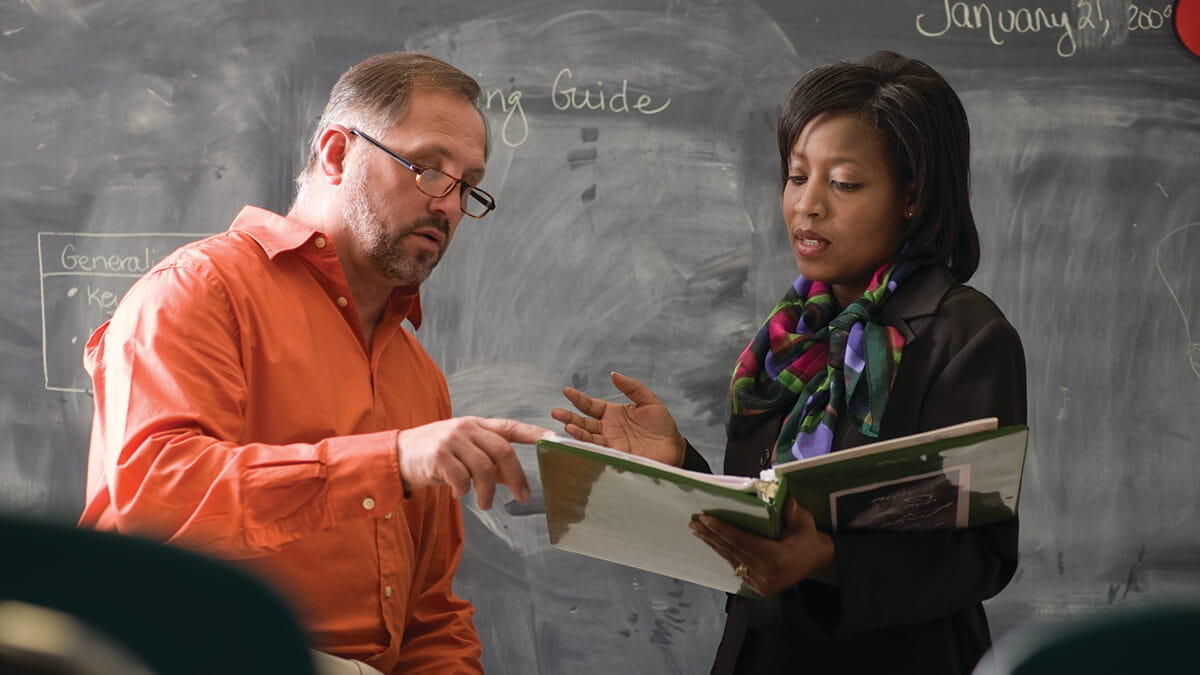Program Details
Curriculum
Minimum Degree Requirements
- Doctoral Writing Assessment (0 cr.)
- Foundation course (5 cr.)
- Research courses (15 cr.)
- Specialization courses (30 cr.)
- Those admitted into the “For Administrators” version of Educational Administration and Leadership specialization will be awarded a five course (25 credit) articulation.
- Completing the Doctoral Capstone
- Doctoral support courses (6 cr.)
- Completing the prospectus (3 cr.)
- Completing the Doctoral Capstone (5 cr. per term for a minimum of four terms; taken continuously until completion)
- One academic residency
View the COMPLETE CURRICULUM PLAN.
To satisfy these completion requirements, you must have access to an administrator, students, and community members associated with a K-12 school setting.
For a personalized estimate of the number of your transfer credits that Walden would accept, call an Enrollment Specialist at 855-646-5286.
Admission Requirements
Program Admission Considerations
Because of its unique structure, the EdD with a specialization in Educational Administration and Leadership (for Administrators) has additional admission requirements:
- A master’s degree or Education Specialist (EdS) degree
- A minimum of 25 quarter credits or 15 semester credits from a university principal preparation program. This may be through a master’s, specialist, or certification program at a university.
- A valid principal license, or eligibility for a principal license based on a university principal preparation program. If not certified, provide a university document that states eligibility for certification based on the program.
- 3 years of administrative experience
- An acknowledgement form verifying you have access to and the ability to collect data from a P–12 school setting
General Admission Requirements
Completed online application, employment history, official transcripts, applicable test scores, and list of transfer credits. Please note that the materials you are required to submit may vary depending on the academic program to which you apply.
More information for international applicants.
Tuition and Fees
| Curriculum | Requirements | Cost | Total * | |
|---|---|---|---|---|
| Tuition-Course Work -Block Transfer: | $0 | $0 | ||
| Tuition-Coursework - Flat Rate Courses: | 3 courses | $1,285 each | $3,855^ | |
| Tuition-Course Work - Per Credit Courses: | 25 quarter credits | $645 per credit coursework and dissertation/doctoral study credits | $16,125^ | |
| Tuition - Doctoral Study/Project: | 20–140† quarter credits | $645 per quarter hour for dissertation/doctoral study credits | $12,900–$90,300* | |
| Program Fee | $175 per quarter | $1,400–$5,600* | ||
| Residency Fee | One Residency | $1,420 (virtual) $1,520 (in-person: travel, lodging and other expenses are additional) | $1,420–$1,520 | |
| Estimated Range: | 2-Year | 8-Year | ||
| $35,700 | $117,400*+ | |||
| (assuming completion in a 2-year timeframe) | (assuming completion in an 8-year timeframe) | |||
These are ranges of what a student can expect in terms of time and tuition cost to complete a degree. It does not include other fees, nor is it adjusted for tuition increases over time. Walden faculty has concluded that generally students who do not complete their program in eight years are unlikely to complete and only allow students to exceed that time frame when a student petitions for an extension and provides good reason for the delay and assurances that obstacles to completion can be overcome. Time is calculated using the time allowed for each semester or unit that the student completes. Students are encouraged to work continuously during the program so as not to extend the time needed to complete the degree as work can become stale and students lose focus. Students who earn two grades of “Unsatisfactory,” who repeatedly drop a course before a semester or unit has been completed, or are unable to complete in the eight year time frame, should expect that they may be dismissed from the program. Walden believes that it is in the best interest of a student who is unable to complete the degree in the stated ranges to strongly consider withdrawal or obtaining a lesser degree.
Time to completion and cost are not estimates of individual experience and will vary based on individual factors applicable to the student. Factors may be programmatic or academic such as tuition and fee increases and/or the student’s transfer credits accepted by Walden; program or specialization changes; unsuccessful course completion; credit load per term; writing, research and editing skills; use of external data for their doctoral study/dissertation; and/or individual progress in the program. Other factors may include personal issues such as the student’s employment obligations; care giving responsibilities or health issues; part-time vs. full-time enrollment; leaves of absence; and/or other personal circumstances.
Tuition and fees are subject to change. Books and materials are not included. Students may incur additional costs for remedial writing assistance, if necessary.
† Based on a 2-year minimum completion requirement and an 8-year maximum timeframe as outlined in Walden academic policy.
^This assumes students successfully complete their coursework on the first attempt.
*Tuition and fees will be higher if students petition to extend the 8-year maximum timeframe or choose to take more expensive elective courses.
+Tuition and time to complete may be reduced if transfer credits are accepted, or if you receive grants, scholarships or other tuition discounts. For a personalized estimate of the number of your transfer credits that Walden would accept, call an Enrollment Specialist at 855-979-6580.
Paying for Your Education
Our Enrollment Specialists can help you outline a plan and find resources for funding your education.
PROGRAM SAVINGS
Program Outcomes
Specialization Learning Outcomes
In addition to the core program learning outcomes, graduates of this specialization will be prepared to:
- Apply knowledge of current research and trends in education.
- Design research to address educational problems and contribute to the profession.
- Collaborate with a variety of external stakeholders (teachers, families, community members) to address the diverse learning needs of students.
- Manage resources effectively for the betterment of the learning environment.
- Create an effective learning environment to enhance student learning.
- Utilize technology to support student learning.
- Demonstrate cultural competence to encourage a diverse learning environment.
- Demonstrate positive professional dispositions (professional conduct, professional qualities, communication, and collaboration).
- Use research-based data to promote student learning.
- Effectively communicate with others (e.g., verbal, nonverbal, written, and technology-based).
- Promote positive social change in the learning environment.
Career Outlook
An EdD can pave the way for a variety of fulfilling careers both in and out of the classroom. Earning your EdD from Walden can prepare you to pursue professional, academic, administrative, research, or clinical positions in:
- The K–12 setting
- Higher education
- Private organizations
- Public institutions
- Civil service
Career options may require additional experience, training, or other factors beyond the successful completion of this degree program.
Testimonials
I was impressed by and attracted to Walden’s vision about nontraditional education and using education as a means to effect global social change.
My Walden experience solidified my commitment to education and renewed my sense of excitement as a leader in the ever-changing world of education.
Studying at Walden changed my world by providing me the skills and knowledge to design teaching curricula and teach at the secondary level.









